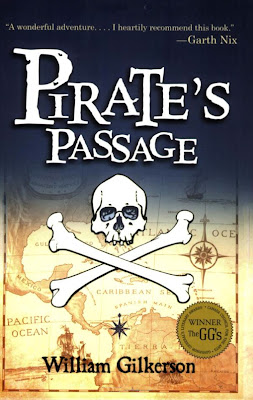One of my favorite graduate students was an expert on pirates. Trying to supervise his research meant that I had an opportunity to learn from him enough about historical piracy to have a working knowledge
Finally, I learned that piracy is every bit as active today as it was in the Golden Age of Piracy, as men at sea make a living by stealing the wealth of others. There are even, my student pointed out, websites for the reporting of pirate attacks, although he explained that the legal tangles such accusations launch means that piracy remains seriously under-reported. There are also companies that promise protection against pirates, selling technology that makes the days when sailors rounding Cape Horn scattered carpet tacks on their decks to thwart robbers seem quaint indeed.
It is in honor of this student that I carry my keys on a fob of pirate flags.
Roger also inspired me to start reading about pirates on my own. Some of the scholarly books out there, notably Robert C. Ritchie’s Captain Kidd and the War Against the Pirates, are smart and worth reading.
But Roger’s tutorial taught me enough to know that the best book on pirates I’ve come across is William Gilkerson’s Pirate’s Passage. It purports to be a children’s story, although the themes it addresses are relevant to everyone. It is the story of the relationship between a young boy in Nova Scotia in the 1950s and an old sailor who brings a 35-foot yawl into the family dock on a treacherously stormy winter night. While the actual age and status of the old sailor is deliberately obscure, there is little doubt that he is—or was—a pirate.
As the weeks pass, the boy endures bullying from the local rich family that is trying to get control of his mother’s valuable real estate and develop it. In the evenings, the mariner tells the boy stories of pirates. Eventually, the child’s quest to defend himself from the local thugs and save his mother’s property becomes a personal exploration of wealth, ownership, and piracy, in the past and the present, forcing the boy to make decisions about what is truly just.
Pirate’s Passage is an engaging romp that tells good history. The author clearly knows his primary sources on piracy, and he often includes passages from them as the elderly man reads to the boy. Gilkerson situates Sir Francis Drake, Mainwaring, Morgan, the buccaneers, and all their peers in their proper
 times and places; he also brings to life what it meant to be a sailor tied to the pirate life: hunting pigs on Hispaniola, raiding passing vessels, and getting a share of the take—a rough life, to be sure, but one that compared favorably to life on a Royal Navy ship, where lice, scabies, whipping, injuries, and endless work were the norm.
times and places; he also brings to life what it meant to be a sailor tied to the pirate life: hunting pigs on Hispaniola, raiding passing vessels, and getting a share of the take—a rough life, to be sure, but one that compared favorably to life on a Royal Navy ship, where lice, scabies, whipping, injuries, and endless work were the norm.But Gilkerson does more than provide a good account of historical pirates. His book is a profound reflection on the meaning of history. The mariner refuses to let his young friend imagine the pirates as fun swashbucklers. They are human beings, trying to negotiate the shifting spheres of politics and power in order to survive and, whenever possible, make their fortunes. The first conversation the old man has with the boy about pirates begins with an observation that speaks directly to what historians do: “Rules are a given,” he says. “What could be more important than seeing who makes ‘em, and who breaks ‘em, and who makes their own, and how it’s worked through time?”
As the old man tells his stories and advises the young man’s exploits, he insists the boy look deeply into cause, effect, and, critically, responsibility. When his young friend dismisses Drake as a criminal, the mariner asks him to reconsider. Was it Drake who was the criminal, he asks, or Queen Elizabeth, who encouraged the famous pirate to go strike a blow for England? Who, exactly, is a pirate, when governments as well as individuals engaged in piracy? What justification for theft of property is acceptable? Are the rules the same for the rich as for the poor? These questions are not just academic in Pirate’s Passage, either. The local family persecuting the boy’s mother represents the local government, forcing the boy to cross a number of legal lines (in extraordinarily interesting ways) in order to protect her property. He becomes, the mariner tells him, a member of the Brotherhood.
In the end, the boy must sift through not only the past but also the present for his understanding of justice. He does so with the guidance of a wily old mariner, who refuses to let him accept easy answers.
It turns out the old salt is not just a pirate, he is a historian.







